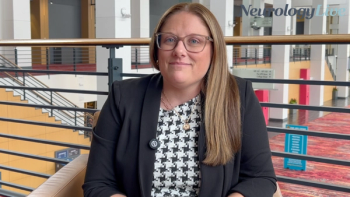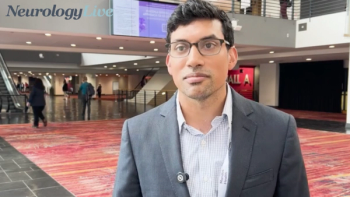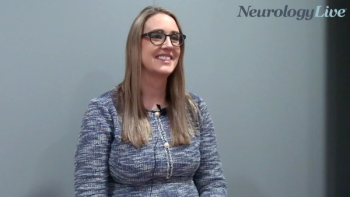
Experts shared their clinical perspectives on trending topics in the treatment and management of multiple sclerosis at the 41st Congress of the European Committee for Treatment and Research in Multiple Sclerosis.

Experts shared their clinical perspectives on trending topics in the treatment and management of multiple sclerosis at the 41st Congress of the European Committee for Treatment and Research in Multiple Sclerosis.

A case series reveals safe use of vamorolone and prednisolone during microdystrophin gene therapy for Duchenne muscular dystrophy in two boys.

A recent study reveals the significant economic burden of Angelman syndrome, highlighting rising healthcare costs and ongoing therapeutic developments.

At CNS 2025, the executive director at the Child Neurology Foundation presented on the importance of collaboration among clinicians and advocacy groups to connect families with care support services. [WATCH TIME: 4 minutes]

A post hoc analysis of the phase 3 EPIDYS trial presented at CNS 2025 revealed that givinostat delayed disease progression in 2 distinct age groups of patients with Duchenne muscular dystrophy.

A recent analysis highlights the link between vastus lateralis fat fraction and treatment outcomes in Duchenne muscular dystrophy patients using givinostat.

Joseph Vithayathil, MD, discusses being awarded the Elterman Research Grant at the 2025 CNS Annual Meeting in Charlotte, North Carolina.

The associate professor and clinician-scientist at the University of Toronto spoke to the current understanding of protein waste clearance in neurodegeneration. [WATCH TIME: 4 minutes]

The BeeLine trial is a placebo-controlled study designed to evaluate radiprodil’s impact on both seizure frequency and non-seizure symptoms associated with GRIN-NDD.

New data reveals bemdaneprocel, an innovative cell therapy for Parkinson disease, shows promising safety and efficacy over 36 months, paving the way for future trials.

A new phase 2 trial explores probiotics' potential to alleviate depression and mood disorders in patients with Parkinson disease, linking gut health to mental well-being.

The neurologist at University of British Columbia discussed how abnormal brain plasticity influences Parkinson progression and highlighted the importance of integrating basic science with clinical care.

Results from the extension phase of the IB1001-203 study, presented as a late-breaker at MDS 2025, suggest N-acetyl-L-leucine prevented worsening of disease progression in patients with ataxia-telangiectasia.

New heatmap analysis reveals continuous apomorphine infusion significantly improves ON time and reduces OFF episodes in patients with Parkinson disease.

In the MOXIe open-label extension study presented at MDS 2025, omaveloxolone treatment was associated with no significant disease progression in bulbar function or upper limb coordination.

The chief of the Movement Disorders Division at Yale School of Medicine discusses the nuance around patient choice in Huntington disease testing and providing treatment regardless of confirmation. [WATCH TIME: 3 minutes]

The chief medical officer of Gain Therapeutics discusses the challenges that are unaddressed with currently available treatments for Parkinson, and how investigational treatments like GT-02287 might address those needs. [WATCH TIME: 3 minutes]

The neurologist at University of British Columbia discussed how breakdowns in brain organization and compensatory mechanisms may influence progression in Parkinson disease. [WATCH TIME: 5 minutes]

Valbenazine shows significant improvements in physical, social, and emotional outcomes for tardive dyskinesia patients, as revealed in a recent study.

The chief medical officer of Gain Therapeutics discusses GT-02287, a promising treatment for Parkinson that has shown strong safety and tolerability in an ongoing phase 1 trial. [WATCH TIME: 3 minutes]

New real-world data confirms the safety and tolerability of high-dose apomorphine infusion for advanced Parkinson's disease, enhancing treatment options.

A phase 2 study shows risvodetinib improves safety and symptoms in early Parkinson disease, suggesting potential as a disease-modifying therapy.

In this final episode, Riley Bove, MD, considers the next phase of MS research, emphasizing the need for innovative trial designs to address sequencing, discontinuation, and subgroup-specific treatment strategies.

New research highlights ecopipam's effectiveness in reducing Tourette syndrome symptoms and relapse risk in children, offering a promising treatment alternative.

Test your neurology knowledge with NeurologyLive®'s weekly quiz series, featuring questions on a variety of clinical and historical neurology topics. This week's topic is on tardive dyskinesia.

In this clip, a multiple sclerosis expert reflects on how ofatumumab’s role has expanded since FDA approval in 2020, from first-line use to special populations, and what this means for daily practice.

Final results from a phase 3 extension study presented at ECTRIMS 2025 demonstrated long-term efficacy and safety of ravulizumab-cwvz in patients with neuromyelitis optica spectrum disorder.

Riley Bove, MD, an associate professor of neurology at UCSF, breaks down the ARTIOS phase 3b trial results, highlighting the exceptionally low relapse rates, MRI outcomes, and safety findings in patients switching therapies.

At ECTRIMS 2025, a staff neurologist at Cleveland Clinic discussed findings from an observational study on long-term safety risks of ocrelizumab in patients with multiple sclerosis. [WATCH TIME: 3 minutes]

Mind Moments®, a podcast from NeurologyLive®, brings you an exclusive interview with Daniel Ontaneda, MD, PhD. [LISTEN TIME: 19 minutes]